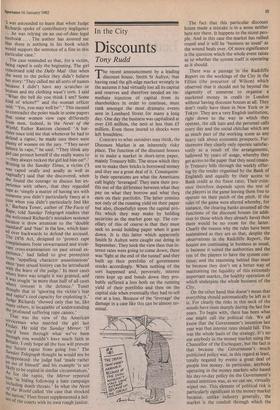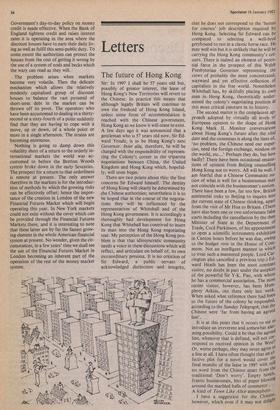In the City
Discounts
Tony Rudd
he recent announcement by a leading discount house, Smith St Aubyn, that having read the gilt-edge market wrongly in the autumn it had virtually lost all its capital and reserves and therefore needed an im- mediate injection of capital from its shareholders in order to continue, must rank amongst the most dramatic events seen in Lombard Street for many a long day. One day the business was capitalised at over £10 million, the next at less than £5 million. Even those inured to shocks were left breathless.
Contrary to what outsiders may think, the Discount Market is an inherently risky place. The function of the discount houses is to make a market in short-term paper, mainly Treasury bills. The straw which they use to make their bricks is borrowed money and they use a great deal of it. Consequent- ly their operations are what the Americans call highly 'leveraged! They earn their pro- fits out of the difference between what they pay on what they borrow and what they earn on their portfolio. The latter consists not only of the running yield on their paper but also, (hopefully) upon the capital pro- fits which they may make by holding securities as the market goes up. The cor- ollary of this of course is that they must seek to avoid holding paper when it goes down. It is this latter which apparently Smith St Aubyn were caught out doing in September. They took the view then that in- terest rates were going to come down, there was 'light at the end of the tunnel' and they built up their portfolio of government stocks accordingly. When nothing of the sort happened and, perversely, interest rates kept up and bonds down they pro- bably suffered a loss both on the running yield of their portfolio and then on the capital side when eventually they had to sell out at a loss. Because of the 'leverage' the damage in a case like this can be almost ter- minal. The fact that this particular discount house made a mistake is in a sense neither here nor there. It happens to the nicest peo- ple. And in this case the market has rallied round and it will be 'business as usual' as the wound heals over. Of more significance is the question which the whole event raises as to whether the system itself is operating as it should.
There was a passage in the Radcliffe Report on the workings of the City in the Fifties (the precursor of Wilson) which observed that it should not be beyond the ingenuity of someone to organise a marketed money in credit in London without having discount houses at all. They don't really have them in New York or in Tokyo. They are a very English institution, right down to the way in which they operate, the silk hats and the personal calls every day and the social chitchat which are as much part of the working scene as any heavy talk about economic prospects. Fur- thermore they clearly only operate satisfac- torily as a result of the arrangements, hallowed by years of usage, whereby they get access to the paper that they need (main- ly Treasury bills through the weekly offer- ing by the tender organised by the Bank of England) and equally by their access to Bank credit at the finest rates. Their exist- ence therefore depends upon the rest of the players in the game leaving them free to operate on their patch of the pitch. If the rules of the game were altered whereby, for instance, the clearing banks assumed all the functions of the discount houses (in addi- tion to those which they already have) then there would be no room for the latter.
Clearly the reason why the rules have been maintained as they are so that, despite the observations in the Radcliffe Report, the houses are continuing in business as usual, is because it suited the authorities and the rest of the players to have the system con- tinue; and the reasoning behind that must be because they don't see a better way of maintaining the liquidity of this extremely important market, the healthy operation of which underpins the whole business of the City. On the other hand that doesn't mean that everything should automatically be left as it is. For clearly the risks in this neck of the woods have risen sharply during the last few years. To begin with, there has been what one might call the political risk. We all know that the Government's intention last year was that interest rates should fall. This was the whole basis of the strategy. It's no use anybody in the money market suing the Chancellor of the Exchequer, but the fact is that because the Government's much publicised policy was, in this regard at least, totally negated by events a great deal of people lost money. In particular, anybody operating in the money markets who based his day-to-day policy on the Government's stated intention was, as we can see, virtually wiped out. This element of political risk is particularly significant in the money market because, unlike industry generally, the market is the conduit through which the Government's day-to-day policy on money credit is made effective. When the Bank of England tightens credit and raises interest rates it is operating in the area where the discount houses have to earn their daily liv- ing as well as fulfil this semi-public duty. To some extent the authorities can protect the houses from the cost of getting it wrong by the use of a system of nods and becks which the wary can read as they will.
The problem arises when markets become very volatile. Then the delicate mechanism which allows the relatively modestly capitalised group of discount houses to balance the vast pyramid of short-term debt in the market can be thrown off its pivot. The operators who have been accustomed to dealing in a thirty- second or a sixty-fourth of a point suddenly find that they are having to cope with a move, up or down, of a whole point or more in a single afternoon. The strains are becoming enormous.
Nothing is going to damp down this volatility short of a return to the orderly in- ternational markets the world was ac- customed to before the Bretton Woods system broke down in the early Seventies. The prospect for a return to that orderliness is remote at present. The only answer therefore in the markets is for the introduc- tion of methods by which the growing risks can be effectively offset; hence the impor- tance of the creation in London of the new Financial Futures Market which will begin operating this year. In New York markets could not exist without the cover which can be provided through the Financial Futures Markets there, and it is interesting to note that these latter are by far the fastest grow- ing element in the whole American financial system at present. No wonder, given the cir- cumstances, in a few years' time we shall see the use of the Financial Futures Market in London becoming an inherent part of the operation of the rest of the money market system.



































 Previous page
Previous page